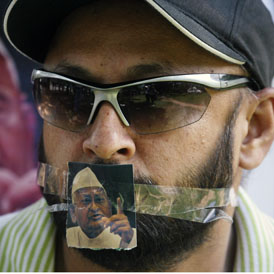India anti-corruption protests are ‘new consciousness’
As demonstrators from all walks of life join anti-corruption protests in India, business leaders tell Channel 4 News: “There is a new generation with a global consciousness of what is happening”
<!–
–> <!–
–>

In the IT hub of Hyderbad, lawyers boycotted courts, students skipped class and hundreds Mr Hazare and his supporters are demanding the introduction of legislation known as the Lokpal Bill, legislation that would give power to an ombudsman to challenge corruption at all levels, right up to the Prime Minister.
Everybody in India would be more comfortable if they could reduce the level of bribery and corruption Arpinder Singh
Arpinder Singh is a leading expert in fraud and corruption at auditors Ernst and Young, based in Mumbai. He says it is the day-to-day issues that are bringing people out in such numbers to protest. He told Channel 4 News: “The normal common man is impacted by traffic tickets, getting electricity, getting approval on a house sale, small logistical things which cause headaches. Then the larger scams cause upset because people see their taxes are not being used correctly.”
He points to the growth of the media, as the spur to the anti-corruption movement: “These things are coming to the surface, it has never created such a noise as at this time. It’s been building up because people have tv in their houses now, the public has become a lot more savvy. There is more economic prosperity, so people can afford computers, cell-phones and the media can’t be suppressed.”
Corruption has been endemic in India for many years, surviving the country’s growth as an economic superpower. Now, experts say it will be ordinary people, rather than business pressure, that brings about change.
‘One of the reasons the scale of corruption is so massive is globalisation’
Dr Ruth Kattumuri is the Co-Director of the Asia Research Centre and India Observatory at the London School of Economics. She told Channel 4 News: “Globalisation lost its opportunity ten years ago. There was a debate about whether businesses should give in to corruption and there was a minority who said no; companies went in for their personal profits. One of the reasons the scale of corruption is so massive now is globalisation.
“It has always bothered me, from when I was a child. What’s happening now is much more a global awareness and an awareness within the nation. It’s being brought out by the media. Even ten years ago when I would address corruption with young people it was considered as inherent and that nothing could be done, you have to go with the flow. Now we have a new generation and a global consciousness of what is happening.”
India's corruption scandals
Telecoms scandal
With half a billion subscribers, India has the world’s fastest growing mobile market. The process of allocating 2G telecom licences in 2008, was - according to auditors - “undertaken in an arbitrary, unfair and inequitable manner”. Police say that bribes were paid to favour certain companies, resulting in licences going to firms with no experience. A Parliamentary inquiry in April this year saw some of India’s top telecom figures brought before a parliamentary committee.
Several people have been charged over the scandal, including the telecoms minister at the time, Andimutha Raja. He denies the charges.
Commonwealth games
Several officials working on the 2010 games have been arrested on charges of forgery and cheating over the awarding of Games contracts. Among them are the Games organising committee chief and leading Congress politician Suresh Kalmadi. He was arrested in April over conspiracy charges related to awarding a multi million pound games contract to a Swiss firm. He has denied any wrongdoing.
Wikileaks
The infamous Wikileaks cables were responsible for uncovering one corruption scandal. In March this year, the Hindu newspaper published a cable that described a senior Congress aide telling a US embassy official of a fund, worth several million dollars, that would be used to bribe MPs to support the government in a crucial vote of confidence in 2008.
Not everyone who opposes corruption agrees that Mr Hazare’s ‘Jan Lokpal bill’ is the right answer. Many think it goes too far in giving an ombudsman power to oversee even the Prime Minister.
Dr Ruth Kattumuri warns that eventually both sides will need to work together: “I think they should find a way of working together, he should be less confrontational.”
Arpinder Singh agrees, adding that the government should look abroad to see what measures work elsewhere. “There are pros and cons to the bill, I can see both sides. At some level top officials need protection, prime ministers need sovereign immunity. My hope is they can sit across the table and sort it out, looking at anti-bribery lawas in the US and UK, asking how they deal with it. Everybody in India would be more comfortable if they could reduce the level of bribery and corruption.”




